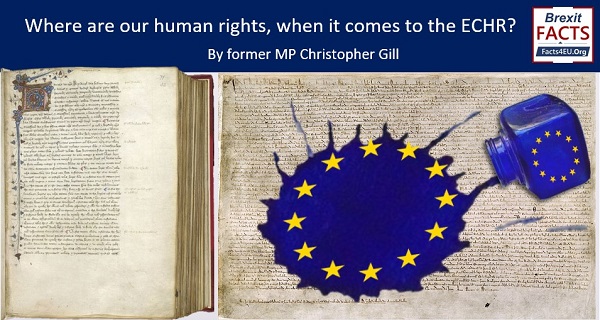The ECHR - What’s in a European name?
'The problems of 4 little letters DO amount to more than a hill of beans in this crazy world'

Magna Carta montage © Facts4EU.Org 2023
Our birthright of habeas corpus, our human rights, and the magnificent Magna Carta
Facts4EU.Org and CIBUK.Org is pleased to present a guest article by the respected former MP Christopher Gill on the very current subject of the ECHR, which is so badly constraining the Government in its options of how to deal with the exponential illegal migrant crisis.

Mr Gill begins his piece with an analogy about a can of beans. Most readers will remember Humphrey Bogart in the iconic film Casablanca, as the jaded bar owner says to the glorious Ingrid Bergman: "The problems of three little people don't amount to a hill of beans in this crazy world."
Well, the problem of four little letters - ECHR - do in fact amount to more than a hill of beans to the British people, and Christopher Gill explains why in his article.
Facts4EU.Org has researched and published many times on the European Convention on Human Rights and its associated Court. The guest article below provides fresh insight from someone who understands these issues well.
About the author
Christopher Gill RD is a former MP (for Ludlow), a former member of the National Executive Committee of the UKIP, and former Hon. President of The Freedom Association (TFA). As a former Conservative Party MP, he was one of the Maastricht Rebels of the mid-1990s and is a confirmed Eurosceptic.
As a constituency MP, Mr Gill fought against the closure of local cottage hospitals – something of great relevance in today’s NHS crisis. Perhaps more notably he is known for being an expert on areas of EU legislation.

At the time of the 2010 election, Christopher Gill stated that his reasoning for standing was: "I am standing against 'call me Dave's' Tories because I cannot tolerate their utter contempt for the concerns of voters on matters of immigration, economy, individual liberty and the broken promise of a referendum on the Lisbon Treaty."
The ECHR - What’s in a name?
By Christopher Gill RD
When opening a can of baked beans one can be almost certain that the contents will match the description on the label.
Not so when one delves into the pages of an international agreement known as the European Convention on Human Rights (ECHR).
To a generally unsuspecting British public it is virtually inconceivable that their ‘human rights’ aren’t comprehensively protected by the aforesaid ECHR – after all, ‘human rights’ is what it says on the front cover.
The provisions of the ECHR are widely regarded as the human rights gold standard but, upon examination, the facts of the matter tell a rather different story.
They demonstrate that the rights enshrined in the ECHR, transposed into British law by dint of the Human Rights Act 1998, are, in significant respects, inferior to those with which we British subjects are actually born.
For example, what might not unreasonably be described as our very birthright includes the all-important law of habeas corpus, once described by the late Archbishop Desmond Tutu as “such an incredible part of freedom”, which, since 1679, has protected us against all forms of coercion.
Far from being the panacea for all human rights ills, the ECHR suffers from some fundamental deficiencies, particularly as far as we British are concerned whose invaluable and indisputable contribution to the wider world’s human rights has its roots in Magna Carta, 1215.
Amongst the most egregious of the ECHR’s several deficiencies are that it specifically does not prevent false accusation, arbitrary arrest and potentially unlimited periods of detention without trial, as the litany of innocent British people served with an European Arrest Warrant (EAW) would surely attest.
A further matter for concern is the fact that presiding over the European Court of Human Rights (ECtHR) are judges drawn from each of the 46 countries in membership of the Council of Europe, some of which have human rights records that leave much to be desired.
The world has changed dramatically since, in the aftermath of the Second World War, the ECHR was conceived. Regrettably it is now being used for purposes for which it was neither designed nor intended.
The human rights abuses in the decade preceding Victory in Europe in 1945 were typified by the appalling concentration camps and the wholesale abuse of those whom the Fascist and Communist dictators arbitrarily condemned to imprisonment, slave labour, starvation and premature death.
Those of us old enough to have witnessed the millions of Displaced Persons criss-crossing Europe in the days following the cessation of armed conflict are left with an indelible memory of human rights abuses that by today’s standards are virtually unimaginable, but which at the time, for compelling reasons, Winston Churchill and others felt moved to try to prevent ever happening again.
Inevitably, because their good intentions had to accommodate two totally different systems of criminal justice - ours derived from Magna Carta and the continental jurisdictions, via the Napoleonic Code, derived from the Inquisition – compromises had to be made. It is those compromises that force the conclusion that substituting the United Nations Universal Declaration of Human Rights (UDHR) in lieu of the European Convention would now, post Brexit, be in Britain’s better interests.
For the record Article 9 of the UDHR unequivocally states that “No one shall be subjected to arbitrary arrest, detention or exile”.
Furthermore the UDHR would, contrast the ECHR, have the effect of making British judges, sitting in British courts, the final arbiters in British human rights cases – surely a most welcome repatriation of a significant aspect of national sovereignty !
- Christopher Gill, 10th January 2023
Observations
We are most grateful to Christopher Gill for his article and we hope readers found it interesting. He is a man of enormous depth of knowledge, having been active over the decades in the fight to free the United Kingdom from the yoke of EU empiricism.
Sooner or later our government has to tackle the issue of the ECHR - the Convention and its Court. We will continue to keep up the pressure until they do.
However there’s little point in the Facts4EU.Org and CIBUK teams working long hours, seven days-a-week, if we lack the resources to promote our work effectively – to the public, to MPs, and to the media. This is where you come in, dear reader.
Facts4EU.Org needs you today
We are a 'not for profit' team (we make a loss) and any payment goes towards the actual work, not plush London offices, lunch or taxi expenses, or other luxuries of some organisations.
We badly need more of our thousands of readers to become members, to support this work. Could this be you, today? It's quick and easy, we give you a choice of two highly secure payment providers, and we do NOT ask you for further support if you pay once. We just hope you keep supporting us. Your membership stays anonymous unless you tell us otherwise.
Please don't assume that other people will keep us going - we don't receive enough to survive and we need your help today. Could you help us? We rely 100% on public contributions from readers like you.
If you believe in a fully-free, independent, and sovereign United Kingdom, please join now by clicking on one of the links below or you can use our Support page here. You will receive a personal, friendly ‘thank you’ from a member of our team within 24 hours. Thank you.
[ Sources: Christopher Gill ] Politicians and journalists can contact us for details, as ever.
Brexit Facts4EU.Org, Fri 13 Jan 2023
Click here to go to our news headlines
Please scroll down to COMMENT on the above article.
And don't forget to actually post your message after you have previewed it!
Since before the EU Referendum, Brexit Facts4EU.Org
has been the most prolific researcher and publisher of Brexit facts in the world.
Supported by MPs, MEPs, & other groups, our work has impact.
We think facts matter. Please donate today, so that we can continue to ensure a clean Brexit is finally delivered.
Paypal Users Only - Choose amount first
Quick One-off
Monthly


Something to say about this? Scroll down for reader comments